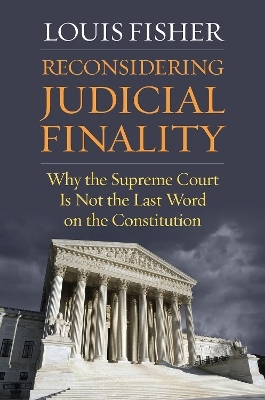
Reconsidering Judicial Finality
University Press of Kansas (Verlag)
978-0-7006-3607-5 (ISBN)
The verdict of Reconsidering Judicial Finality is clear: to treat the Supreme Court’s nine justices as democracy’s last hope or as dangerous activists undermining democracy is to vest them with undue significance. The Constitution belongs to all three branches of government—and, finally, to the American people.
Louis Fisher is scholar in residence at The Constitution Project in Washington, D.C., and visiting scholar at the William and Mary Law School. From 1970 to 2010 he served in the Library of Congress as senior specialist in separation of powers at Congressional Research Service and specialist in constitutional law at the Law Library. His many books include Constitutional Conflicts between Congress and the President, Sixth Edition, Revised; Presidential War Power, Third Edition, Revised; Military Tribunals and Presidential Power, winner of the Richard E. Neustadt Award; and Supreme Court Expansion of Presidential Power, all from Kansas.
Preface
Note on Citations
1. Early Claims of Judicial Finality
-Debating Judicial Review
-Who Has the Final Word?
-Influence of John Marshall
-William Marbury's Lawsuit
-Additional Lessons
-Reflections on Marbury
-Continuing Debate
2. Selections by Chief Justice Hughes
-Dred Scott’s Case
-Reactions to Dred Scott
-Legal Tender Cases
-Income Tax Cases
3. Rights of Blacks
-Opposition to Slavery
-The Civil War
-Congressional Safeguards, Judicial Opposition
-Access to Public Facilities
-“Separate but Equal” Doctrine
-Brown v. Board
-The Civil Rights Act of 1964
-Judicial Resort to Busing
-A Continuing Dialogue
4. Rights of Women
-Doctrine of Coverture
-Myra Bradwell’s Initiatives
-Belva Lockwood Goes to Congress
-Judicial Rulings from 1875 to 1971
-Equal Rights Amendment
-Equal Pay for Women
-Equal Pay for Women
-Lilly Ledbetter Seeks Justice
-Additional Disputes
5. Regulating Commerce
-Wheeling Bridge Cases
-Controls on Intoxicating Liquors
-Liberty of Contract
-Congress and Child Labor
-Court-Packing Plan
-Child Labor Returns
6. The Sole-Organ Doctrine
-Problems with Dicta
-The Issue inCurtiss-Wright
-Treaty Negotiation
-Marshall’s Sole-Organ Speech
-Jerusalem Passport Case
-The Supreme Court's Opinion
-Creating a New Presidential Model
7. Privacy Rights
-Mandatory Sterilization
-Defining Obscenity
-Use of Contraceptives
-Abortion Rights
-Reexamining Roe
8. Religious Liberty
-Protecting Minority Rights
-Forming Constitutional Principles
-Military Chaplains
-Quakers and Military Service
-Compulsory Flag Salutes
-The Yarmulke Case
9. Japanese-American Cases
-Roosevelt’s Executive Order
-Detention Camps
-Evaluating the Court
-Fraud Against the Court
-Analysis by Peter Irons
-Acknowledging Judicial Error
10. State Secrets Privilege
-Aaron Burr’s Trial
-Civil War Precedent
-Three Widows in Court
-At the Appellate Level
-The Supreme Court Decides
-Fraud Against the Court
-Contemporary Issues
11. Legislative Vetoes
-Origins of the Legislative Veto
-Presidential Reorganization Authority
-“Come into Agreement” Provisions
-Challenges by President Carter
-INS v. Chadha
-Legislative Vetoes After Chadha
-Presidential Signing Statements
-Some Lessons
23. Campaign Finance
-Sources of Judicial Error
-Congressional Legislation
-Continued Errors about Santa Clara
-Buckley v. Valeo
-Judicial Attacks on Buckley
-Citizens United
-Responses to Citizens United
Conclusions
About the Author
Index of Cases
Index of Subjects
| Erscheinungsdatum | 02.08.2023 |
|---|---|
| Verlagsort | Kansas |
| Sprache | englisch |
| Maße | 152 x 229 mm |
| Gewicht | 272 g |
| Themenwelt | Geisteswissenschaften ► Geschichte ► Regional- / Ländergeschichte |
| Recht / Steuern ► Allgemeines / Lexika | |
| Recht / Steuern ► EU / Internationales Recht | |
| Sozialwissenschaften ► Politik / Verwaltung ► Staat / Verwaltung | |
| ISBN-10 | 0-7006-3607-2 / 0700636072 |
| ISBN-13 | 978-0-7006-3607-5 / 9780700636075 |
| Zustand | Neuware |
| Haben Sie eine Frage zum Produkt? |
aus dem Bereich


